2018 Tang Prize Week
Another two years have passed, and another Tang Prize has been awarded. Just two short months ago, the newest laureates arrived in Taiwan for a series of events and talks from September 19 through 27. This year, 2018, was a year of firsts and mosts—the year with the most events and the most laureates, as well as the first Tang Prize laureates to win a Nobel Prize.
Beginning with the reception, Tang Prize Week drew the attention of worldwide media for the caliber of the year’s laureates and their important contributions to society. Local and foreign media, such as Taiwan’s English radio station ICRT and Japanese media, came to Taiwan to participate in events. This year also saw the most media penetration in online outlets.
Although the award ceremony and the week of events had ended by the end of September, October held some more surprises for past Tang Prize laureates. On October 1, Drs. James Allison and Tasuku Honjo, both inaugural recipients of the Tang Prize in Biopharmaceutical Science, were announced as winners of the Nobel Prize in Physiology or Medicine for 2018 for their work on cancer immunotherapy. The win drew plenty of press to the Tang Prize Foundation seeking pictures of Allison and Honjo together; in fact, the 2014 Tang Prize was the first prize to recognize the exact combination of Allison and Honjo for their contributions to immunotherapy.
The Tang Prize offers its most celebratory congratulations to James Allison and Tasuku Honjo!
For more event details, please visit the Tang Prize website
Or visit the Facebook fanpage
|
|
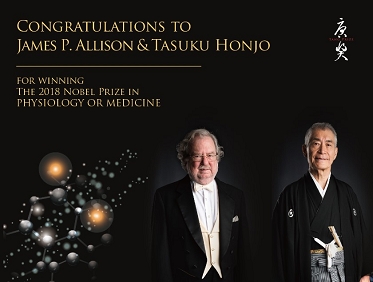 2018 Nobel Prize for Medicine Awarded to Inaugural Tang Prize Laureates
Four years ago, Drs. James P. Allison and Tasuku Honjo were awarded the inaugural Tang Prize in Biopharmaceutical Science for their work on cancer immunotherapy. Now, four years later, on October 1 of this year, Allison and Honjo were announced as the recipients of the 2018 Nobel Prize in Physiology or Medicine for the same work, proving the farsightedness of the Tang Prize.
Allison and Honjo were chosen in 2014 for their discoveries of CTLA-4 and PD-1 as immune inhibitory molecules, revealing ways to harness the incredibly powerful human immune system to fight cancer and marking the beginning of the immunotherapy revolution. In initial clinical trials in melanoma patients, tumors in 2/3 of the patients were reduced; the survival rates at two years post treatment also improved, to a promising 90%. Allison and Dr. Honjo’s discoveries have announced a new therapeutic era in medicine.
Read more
|
|
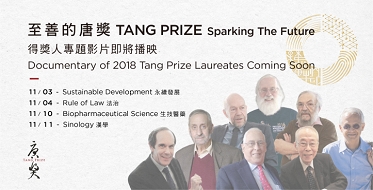 Learn about the World’s Greatest Achievements: the 2018 Tang Prize Documentaries
Uncommon accomplishments, uncommon lives, and uncommon times: Take a deeper look into the lives of the eight 2018 Tang Prize laureates in four new documentaries. Sponsored by the Tang Prize Foundation and produced by the China Television Company, four documentaries, one per category, are now available for viewing.
The documentary in Sustainable Development features the inspiring stories of James E. Hansen and Veerabhadran Ramanathan, as well as their perspectives and insights into climate change and the necessary human response. The Biopharmaceutical Science documentary recounts the development of targeted therapies for cancer: from Tony Hunter’s discovery of protein tyrosine phosphorylation and tyrosine kinases as oncogenes, to their successful application by Brian J. Druker in the drug imatinib and John Mendelsohn in cetuximab, both effective therapies.
The documentary in Sinology recounts the stories Stephen Owen, scholar of Chinese Classical poetry and a leading scholar on Tang poetry studies and translation, and Yoshinobu Shiba, a leading authority on Chinese social-economic history, especially that of Song China. Owen challenges received notions of what literary works are all about through his close readings of classic texts. And Shiba is equally steadfast in his study, holding to the positions he reaches through economic and social examination of the records. Lastly, the documentary for the Rule of Law field looks at the life and philosophy of an exemplary legal scholar, Joseph Raz, and the influence he had over his students.
Read more
Video
|
|
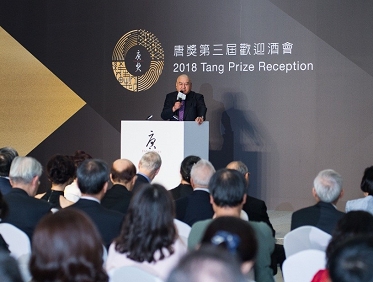 The Opening Night of Tang Prize Week
Inaugurating the full week of events for 2018, the Tang Prize Reception was the first chance to see the 2018 laureates together under one roof.
New for 2018, the reception was held at Taipei’s Chiang Kai-shek Memorial Hall, alongside the Tang Prize exhibition.
Greeting the honored guests, prize founder Samuel Yin said that the Tang Prize was founded as a conscious response to 300 years of rapid human progress. Taipei City Mayor Ko Wen-je then expressed his honor on behalf of Taipei City in hosting the prize in its third awarding. Over the past six years, Taipei has been host to many prize events, allowing the public to better know the accomplishments of the laureates and the laureates to better know the city and its people.
Prior to the event, the laureates shared their reactions to the prize announcements. Tony Hunter, one of three joint laureates in Biopharmaceutical Science, said that to have his research on cancer treatment recognized by the Tang Prize was an especial honor as well as a hopeful sign for future research. Joseph Raz, sole laureate in Rule of Law, said that receiving the award was a great honor and that it recognizes research as well as exerts an encouraging influence on society and scholars.
In addition to the honored laureates, several guests joined the welcoming atmosphere: Shu Chien (Professor at University of California San Diego and acting chairman of the Tang Prize Selection Committee); Boris Vladimirovich Gusev (President of the Moscow-based International Academy of Engineering and the Russian Academy of Engineering); Ji Wei-de (representative of the Netherlands Trade and Investment Office); Benoit Guidee (Director of the La France à Taiwan); Rupert Cao (Deputy Executive Director of the Canadian Trade Office in Taipei); Chin-shing Huang and Fu-Tong Liu (Vice Presidents of the Academia Sinica); and representatives from the academic and private sectors.
Read more
|
|
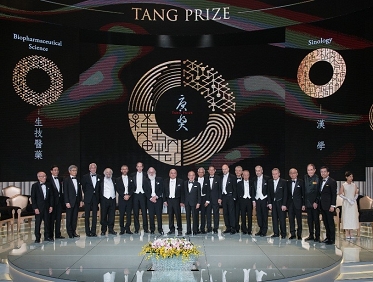 Each Year Better than the Last: Tang Prize Awards Eight Laureates
A record eight Tang Prize laureates were awarded in front of an audience of over 2,000 guests at the 2018 Tang Prize Award Ceremony, held at Taipei’s iconic Sun Yat-sen Memorial Hall on September 21. Veerabhadran Ramanathan and James E. Hansen were awarded in Sustainable Development; Tony Hunter, Brian J. Druker, and John Mendelsohn in Biopharmaceutical Science; Stephen Owen and Yoshinobu Shiba in Sinology; and Joseph Raz in Rule of Law.
Former US Vice President Dan Quayle, President Boris Vladimirovich Gusev of the International Academy of Engineering and the Russian Academy of Engineering, and President of the Control Yuan Chang Po-ya were among the many notable heads of state and academia in attendance.
Each of the laureates noted the significance of receiving such a rare honor. Hansen again highlighted the impact that climate change has on our everyday lives; Ramanathan added that climate change has become a problem not just of technology, but one of morality and justice. Both Druker and Mendelsohn expressed their admiration for Hunter’s discovery of tyrosine phosphorylation and that the oncogene src is a tyrosine kinase, a discovery which opened the door to their targeted therapies for cancer, imatinib and cetuximab.
Owen and Shiba shared their years of work in the field of Sinology and expressed their thanks at receiving recognition. Raz, recipient in Rule of Law, spoke of the essence of the rule of law: its transparency, stability, and predictability in consistent and universal application to human affairs, whether they be individual or societal or national.
Read more
|
|
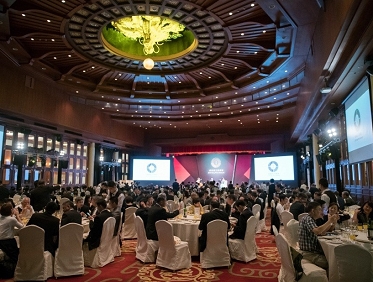 Accomplishment Celebrated through Food and Art
The Tang Prize Banquet opened its doors on the night of September 21 at the Grand Hotel in Taipei. Prize founder Samuel Yin, President of the Control Yuan Chang Po-ya, and representatives from business, government, and academia joined the laureates who had been awarded earlier that afternoon.
Chang noted how wonderful it was to see the prize gain in notoriety around the world while also benefiting humanity. She reminded the audience that climate change has proven to be an increasingly intractable problem for the entire world—especially for nations with less influence in world affairs. Even influential nations like Japan, the US, and Australia have felt the effects of this global issue. She expressed her admiration for Samuel Yin in creating a prize which addresses the crucial connection between humanity and environment.
While guests were wowed with such unique dishes as salted mullet roe, dragon tiger grouper, Japanese wagyu beef, and red quinoa, the penultimate dish of the night was a dessert—sweet chrysanthemum soup with chrysanthemum-shaped tofu, made by internationally renowned chef Xu Yao-guang. Xu first cuts tofu with a round mold and then makes a total of 108 cuts vertically and 108 cuts horizontally, each 0.5 centimeters in depth; the flower-like tofu is then placed in a sweet chrysanthemum soup, where its 11,664 petal-like strands bloom.
Back by popular response was the Taiko drum troupe U-Theatre and the Great River Arts Group, adding music to the culinary wonders of the night.
Read more
|
|
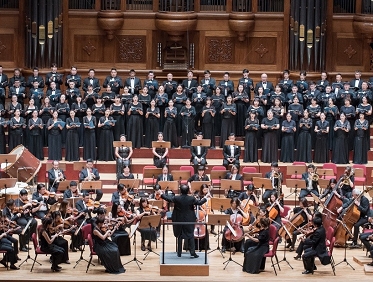 Concert Evokes Past to Celebrate Present Accomplishment
Resounding through the halls of Taipei’s National Concert Hall on September 24, the Tang Prize Concert wowed the audience with its wide selection of classical and modern music. Conducting for the National Symphony Orchestra and Taipei Philharmonic Chorus was Shao-Chia Lü, who brought out a time-tested repertoire.
The concert began with a perennial favorite, the Fanfare for the Tang Prize. This was followed by Mozart’s Clarinet Concerto in A major, its sprightly, cheerful, nimble style played perfectly by clarinetist, composer, and conductor Jörg Widmann. The second half of the evening began with another piece from Mozart, his Requiem. The piece is a wonderful exposition of the limits of the flesh and the eternal brilliance of the human spirit. Finally, wrapping up the evening, was Gordon S. W. Chin’s The Sun Rises over Taiwan, a paean to the famous Alishan (Mt. Ali). From East to West, each of the night’s songs was chosen for this special occasion, to give the laureates an unforgettable evening.
Read more
|
|
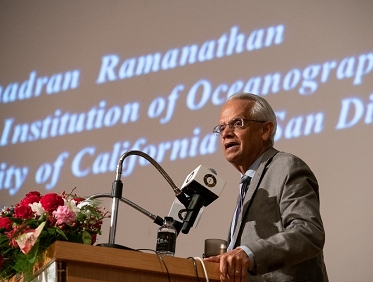 A Day of Eight, Great Mind-opening Lectures
The 2018 Laureate Lecture series dealt with a variety of topics: climate change, targeted therapies, Tang poetry, Chinese socio-economic history, and legal philosophy. Lectures were delivered over the course of one day, September 22, at the Howard Civil Service International House.
The first lecture of the day was in Rule of Law, delivered by Joseph Raz. Raz provide clear insight into the basic essences of the law: it should be reasonably clear, stable, publicly available, and have general rules and standard that are applied prospectively and not retroactively. He explained that the rule of law, when properly operating, is open to the understanding of the government and the governed, thus both government and the governed may be guided by the law. On the topic of transitional justice, Raz noted that an overzealous approach to exacting justice can result in massive harm to a nation. It must never be forgotten that the people of a nation must still be able to live their lives, no matter the transition.
The next lectures of the day were given by the laureates in Biopharmaceutical Science: Tony Hunter, first to present, was the discoverer of tyrosine phosphorylation and that the oncogene src is a tyrosine kinase. His foundational finding was used by other researchers, primarily Brian Druker and John Mendelsohn, to develop target treatment therapies for cancer. During the press conference following the lecture, laureates discussed the future for precision and individual medical therapies. Medical professionals in the future will be able to address the genetic aspects of a disease as well as habits and surroundings.
The third lecture session of the day was in Sustainable Development. James Hansen, over his years of study, saw the consequences of society burning through fossil fuels. He has called for the government to place more effort on the issue of climate change from the belief that it is this generation’s responsibility. Veerabhadran Ramanathan discussed his research of the past several years and his cooperation with the United Nations Environment Programme. He hopes to help to reduce the amount of short-lived pollutants, encourage more environmental cooking energies, implement Project Surya (a project that aims to improve public health), and reduce the threat of global warming.
The last round of lectures was delivered by the recipients in Sinology. Stephen Own told an engaging story on Su Shi, a Song dynasty poet and painter, and interactions with his teacher. Yoshinobu Shiba, well known for his research into the socioeconomic history of China, talked about transportation, social mobility, and the role of the merchant of the Song dynasty. During the press conference, Owen added that his translations into English did not recreate the tonal structure or rhyming scheme of the original Chinese, and that his translations are primarily for people who do not understand Chinese. Shiba, asked about the purpose of overseas Chinese workers in the Song dynasty, responded that according to the logs kept on foreign work, that they would send large amounts of money back home.
Read more
|
|
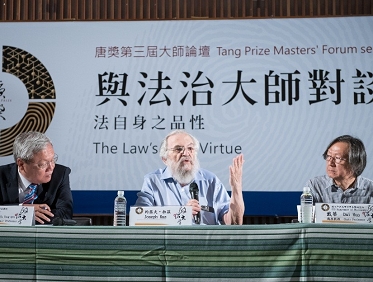 As Tang Prize Week Ends Laureates Speak and Inspire Throughout Taiwan
One of the hallmarks of Tang Prize Week, the Tang Prize Masters’ Forum series is a series of roundtable talks among laureates and international experts. Laureates report on their recent research and, more importantly, give advice to the younger generation. This year, seven sessions were held across Taiwan.
Two forums were held for the laureates in Sustainable Development—James E. Hansen at National Central University on September 25 and Veerabhadran Ramanathan at National Chung Hsing University on September 28. Hansen’s advice was that the youth needs to stand up and ensure that their rights are protected. If they are to be successful, they need to understand the problem clearly and maintain a scientific methodology. Ramanathan told his audience that education is one way to bring the seriousness of the issues to the attention of the youth and help them along the path to finding solutions. He also sees the use of social media in spreading factual science on climate change.
Two of the three recipients in Biopharmaceutical Science participated in forums for 2018—Brian J. Druker at China Medical University on September 25 and Tony Hunter at National Taiwan University on September 26. Druker presented his lecture to an attentive audience and encouraged the young student audience to continue down the road of curiosity. In the talk given by Hunter, he explained his enthusiasm throughout his long scientific career. His advice to his researchers has been to explore research topics in other fields: they could explore one “safe” topic and indulge a bit in one “risky” or “bold” topic. That way they could maintain curiosity and practice making important connections between fields that may result in new discoveries.
In the field of Sinology, recipients Stephen Owen and Yoshinobu Shiba delivered talks at National Taiwan Normal University and National Cheng Kung University on September 26 and 27. Owen tackled the problems of reading and translation in his speech and advised understanding all the details of a text. Shiba spoke on, appropriately, the topic of Tainan itself. He talked of the urbanization of the city, stressing that Tainan, the capital in the early days of Taiwan, has retained much of its buildings and artifacts for archaeologists, ethnographers, and historians to investigate.
In Rule of Law, Joseph Raz spoke on September 25 at National Chengchi University. On the question of transitional justice, Raz emphasized that justice is not “attained” just due to the presence of rule of law. Those involved try to gain the consensus of society between the new rule and the old, and relate with each other peaceably.
Read more
|
|
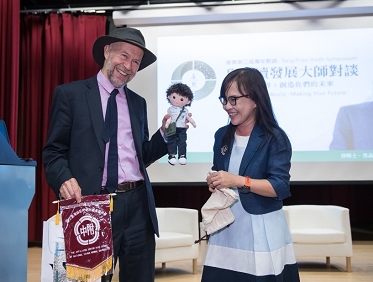 Inspiring Youth to Engage with the Future
On September 26, James E. Hansen delivered a speech to more than 200 young students at Affiliated Senior High School of National Taiwan Normal University (HSNU) on the topic “Young People's World: Making Your Future,” and engaged with the curious students in lively discussion.
Previous director of the NASA Goddard Institute for Space Studies and adjunct professor of Earth and Environmental Sciences at Columbia University, Hansen has been active in the study of climate change for the past 30 years, over which time he has contended on multiple occasions with the government. Concerned for the future of the earth, he has called on the youth to work together to protect both their rights and their planet.
Hansen advocates the spirit of science and education, the collection of resources, and being self-critical and accepting of examination. Hansen further stressed the need for objective, quantified data on the advantages and disadvantages of each type of energy, be it fossil fuel, nuclear, or renewables. Only then can the discussion bring us closer to an effective model for energy.
Questioners were curious and eager for debate. On the question of nuclear energy, Hansen acknowledged that the level of education in Taiwan was quite high: thus, it is a question that can be put up for public debate and evaluation. In the end, it is up to the informed citizenry to use scientific methods to compare and weigh the relative advantages and disadvantages.
Students from high schools all over Taiwan, including Taipei First Girls' High School, Taipei Municipal Zhongshan Girls High School, and National Taitung Girls' High School, gathered to listen to Hansen’s advice. HSNU Principal Wang presented several HSNU gifts to Hansen at the end of the event, and gathered smiling students together for a group photo.
Read more
|
|
|
